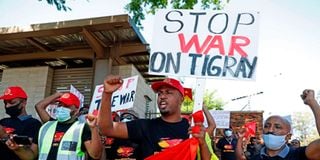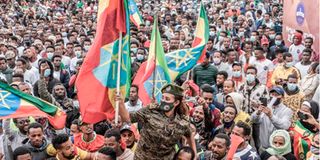Premium
Horror of 50 bodies in Ethiopian river fuels push for humanitarian corridor

Ethiopians from the Tigray region hold placards while they gather and protest outside the Department of International Relations and Cooperation (DIRCO) in Pretoria, South Africa, on November 25, 2020.
What you need to know:
- Since the war began, Ethiopian, Eritrean and allied militia have faced accusations of atrocities, which they have denied.
Washington’s aid chief Samantha Power is expected in Addis Ababa on Tuesday to push for a special corridor for humanitarian assistance to civilians in the troubled Tigray region by one of Ethiopia’s biggest donors.
She was expected in Addis Ababa on Tuesday evening to meet with Prime Minister Abiy Ahmed.
The visit comes on the backdrop of a horrific discovery of dead bodies floating in a river shared by Sudan and Ethiopia near Tigray.
On Monday, Power indicated that her trip to the eastern parts of Sudan that had been receiving refugees from Tigray had given her harrowing accounts of atrocities.
“Deeply troubling reports from Ethiopia-Sudan border. I was in eastern Sudan today & heard harrowing stories from refugees who fled same area,” she tweeted.
“Warring parties must immediately facilitate humanitarian access and commit to a ceasefire before more lives are lost.”
50 bodies
Power had on Sunday and Monday toured parts of Sudan including Darfur and internally displaced people’s camps in the country.
But it was in eastern Sudan region of Kassala that she came closer to atrocities in Ethiopia.
She visited a local refugee centre on Monday, where she spoke to women and children who fled the war in Tigray on atrocities back home.
Her comments came after the Associated Press, quoting anonymous sources in Sudan, reported that at least 50 bodies had been retrieved from the Setit-Tekeze River which flows between the two countries.
The bodies had gunshot and cut wounds, with some with the limbs tied together at the back.
While the bodies’ true identity and actual number was yet to be determined, witnesses reported that some had tattoos and other bodily piercings common among people in Tigray, suggesting they were victims from the region and probably killed in the current conflict.

A member of Ethiopian military force holds the Ethiopian national flag during a farewell ceremony for new recruits joining the Ethiopian military force to Tigray, organised by the Mayor in Addis Ababa, on July 27, 2021.
Ethiopia’s past reaction
Ethiopia did not immediately respond to the reports of the bodies in the river, but officials have been swatting away the US pressure on Addis Ababa, accusing the international community in general of not reprimanding the Tigray People’s Liberation Front (TPLF).
“TPLF tried in vain to hide the Mikadra massacre by concocting unending stories of genocide in various areas. No one will forget how the terrorist group savagely slaughtered civilians and day labourers just because of their ethnicity. This will not go unpunished,” Dina Mufti, spokesman of the Ethiopian Foreign Ministry told a press conference, referring to the massacre back in November in Tigray, first reported by Amnesty International.
Since the war began, Ethiopian, Eritrean and allied militia have faced accusations of atrocities, which they have denied.
“The TPLF has continued discrediting the unilateral humanitarian ceasefire, endangering the people of Tigray, particularly farmers. The international community must force the TPLF to respect the ceasefire.”
The US, one of the biggest donors to Ethiopia, intends to spend about $278 million on health, education and agricultural upgrades in the country.
But Washington has been calling for a ceasefire ever since Abiy launched an offensive on the TPLF, once a ruling party but now considered in Addis as a terrorist group.
In June, the Ethiopian government, which had initially declined dialogue or a ceasefire with the TPLF, announced a unilateral decision to lay down the arms.
Addis Ababa argued it was doing so to allow humanitarian access but the TPLF did not honour it and instead continued with the offensive.

Ethiopian Prime Minister Abiy Ahmed.
Ceasefire conditions
In late July, Ethiopia cancelled the ceasefire and amassed regional militia against the TPLF, which responded by attacking neighbouring regions of Amhara and Afar.
On Sunday, the group issued a six-point condition for a ceasefire, including reinstatement of essential power and telecom services, freeing of all captured fighters, a stop to the harassment of ethnic Tigray people as well as the release of withheld monies for this year’s budget for Tigray region.
TPLF spokesman Getachew Reda said all these conditions must be met before a ceasefire is considered.
The problem, though, is that Ethiopia considers captured TPLF fighters or their officials are terrorist suspects and initially refused to sit down with the group.
This position has also ensured difficulty in negotiations for a humanitarian corridor, UN officials say.
The Nation understands, however, that Prime Minister Abiy prefers a ‘national dialogue’ with all Ethiopian regions, rather than facing the TPLF for talks on ending the conflict.
In fact, Abiy wants the Tigray interim government he appointed to continue representing the region until proper security is available for elections





